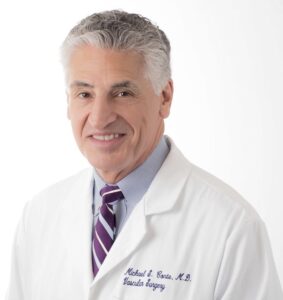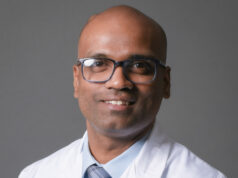
Huge opportunities abound for vascular surgeons to take a leadership role on the frontlines of a developing peripheral arterial disease (PAD) treatment crisis in the U.S., said Michael Conte, MD, as he gave the second annual Frank J. Veith Distinguished Lecture on the closing day of the 2024 Vascular Annual Meeting.
Conte spoke on “The State of PAD Care in the U.S.,” taking the opportunity to call on vascular surgeons to take a leadership role amid great unmet need among a population who face a significant public problem.
“There are a lot of exciting developments, and vascular surgery really needs to seize the day to lead in the science, lead in the challenges; it’s core to what we do, it’s core to our patient population,” the professor and chief of vascular and endovascular surgery at the University of California San Francisco (UCSF) explained, speaking to VS@VAM on the sidelines of VAM 2024 ahead of the lecture.
“I think it’s a really great time for vascular surgeons to get involved, whether that’s in the clinical research, the disparities and access to care issues, amputation prevention programs, or multidisciplinary care.
“There’s a lot there for young vascular surgeons to embrace,” Conte continued. “The service part as well as the research part are significant. So, if you look at what’s happening at the SVS with the VISTA [Vascular Volunteers In Service To All] program, all the way through to promoting clinical trials in PAD, this is the time—it’s a generational thing.”
With carotid disease now “pretty stable,” and the strides made in aortic disease treatment meaning “we’ve solved a lot of stuff ” in that domain, he said, many roads now lead to PAD, which he described as a “huge thing that needs a lot of help.”
First comes the opportunity, Conte declared, then the nature of the growing, countrywide public health problem— advancing age, diabetes not abating.
“We need to embrace and promote science-guided, evidence-based practice,” he said. “To do that, we have to continue to try to follow through on designing and executing clinical trials using our registries to address important issues of quality of care, and continue to write and update meaningful practice guidelines. It’s a multispecialty space and we should embrace that, not shy away from it. We should just lead.”












